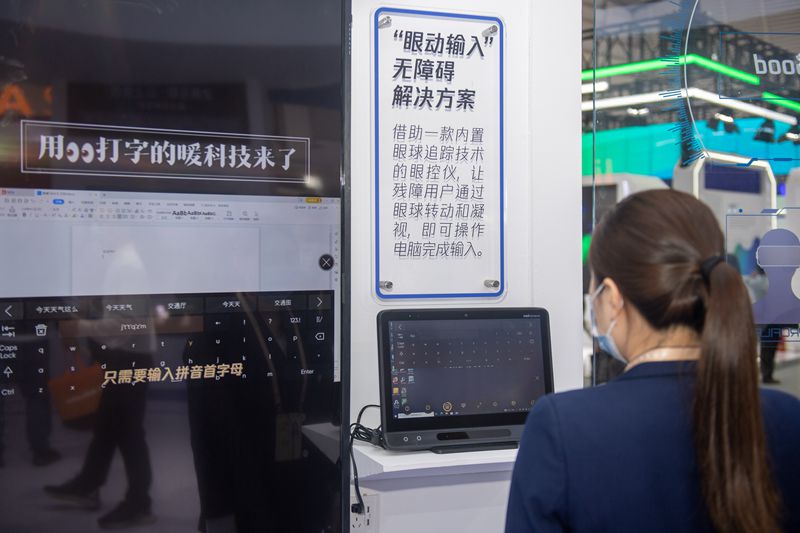"Accept my invitation to Temu to help me get my gift!" If you have ever received this invitation link from your friends, congratulations! You are now a "team" member of online marketplace Temu, whose name is derived from its slogan—Team Up, Price Down.
Temu, launched in September 2022, is the U.S. edition of Pinduoduo, a Chinese online shopping platform that sells everything from groceries and home appliances to iPhones and the largest e-commerce player in China in terms of registered users. Pinduoduo offers consumers items at lower prices or even for free—if they can find enough friends to click the links they share. The business model copied from China has now found early success in the overseas market.
Similarly, watching short videos by swiping up or down has turned into a globally prevalent viewing habit thanks to the popularity of TikTok, the international version of Chinese short video app Douyin. The imported application currently rivals U.S. domestic giants such as Instagram and Facebook in downloads and YouTube in average usage time, according to data analysis providers Data.ai and Sensor Tower.
And the list goes on. As of April 2022, Chinese fast-fashion app SHEIN had surpassed its closest competitors, Uniqlo and Zara, in terms of market value. The app now has more downloads in the U.S. than Amazon. Then there's Genshin Impact, an open-world action role-playing game, owned by Chinese online video game developer miHoYo, which has generated more than $4 billion from global user spending since its launch in September 2020... Chinese digital platforms are fully exploring overseas markets.
China's platform economy, defined as the transfer of economic and social activity—which had previously been conducted primarily offline—into the digital realm, is the largest in the world not only in raw numbers but also in terms of the proportion of the country's population.
Nevertheless, since 2021, the chaotic business practices of some platform companies, such as abuse of dominant market positions and privacy and data security breaches, had led to industry-wide regulatory crackdowns. In more than one year, many online platforms, voluntarily or not, slowed their expansion and conducted internal overhauls. One example here was that of ride-hailing service provider Didi: In July 2021, the Cyberspace Administration of China ordered app stores to remove the Didi app from their list of offerings, citing data breaches. "Verified complaints showed that Didi has seriously violated laws and regulations in its collection and use of personal information," the regulator said in a statement.
An upturn emerged as policies kept rolling out in support of the platform economy since 2022.

A strong signal
The growth rate of China's platform economy slowed down over the past three years due to a range of factors, including online population peaking, downward pressure on the economy, tightened government supervision and an uncertain global environment, Zhang Chunfei, a researcher with the Policy and Economic Research Institute under the China Academy of Information and Communications Technology (CAICT), wrote in an article published on China Daily on December 26.
But several central-level meetings in March, May and July of 2022 sent a strong signal that authorities would encourage the healthy and sustainable development of the platform economy.
The annual Central Economic Work Conference, taking place on December 15-16, and laying out policy priorities for 2023, reiterated that the government will give the digital economy and platform companies a new push, adding efforts will be made to improve supervisory standards and support platform enterprises to fully embrace their capabilities in pioneering development, job creation and international competition.
"As the country now keeps sending positive signals and improving and optimizing its laws, regulations and management systems, it will facilitate the healthy and sustainable development of the platform economy and shore up confidence of both investors and business operators," Guo Tao, an angel investor and senior digital platform expert, told Beijing Review.
"Bolstering the development of the platform economy is an important measure the government has taken to give full play to its role in resource allocation and market integration given the regulation of the industry has made positive progress," Song Xiangqing, Director of the Research Center for Industrial Economy at Beijing Normal University, told Beijing Review. "With updated policies and regulations, platform enterprises can further enlarge their existing business and align their own goals of growth with the national strategies."
In addition, the China Securities Regulatory Commission (CSRC) and the Ministry of Finance signed an audit oversight cooperation agreement with the U.S. Public Company Accounting Oversight Board (PCAOB), the country's independent regulator of public company auditing work, last August. It followed a U.S. legislation created in December 2020 requiring Chinese companies listed on U.S. stock exchanges to open their books to the country's audit watchdogs. If they failed to comply with the requirements for three straight years, they would be delisted. The agreement allowed the PCAOB to inspect the audit work of these firms.
On December 15, 2022, then, the PCAOB confirmed it was able to gain full access to inspect and investigate the accounting firms headquartered in the Chinese mainland and China's Hong Kong Special Administrative Region. This confirmation prevents the possible and immediate delisting of over 200 China-based public companies from U.S. stock exchanges.
"The results of China-U.S. audit oversight cooperation are a boon to investors, listed companies and the platform economy," Song said. "As the immediate delisting risks of the U.S-listed Chinese platform companies have been eliminated, they can do more in the U.S. capital market."
"For U.S.-listed Chinese platform companies, the major uncertainty affecting stock prices and their future development has been removed," Yang Haiping, a researcher with the Institute of Securities and Futures at the Central University of Finance and Economics, told Beijing Review. "Their profitability is expected to recover and there is now room for upward valuation."

A visitor tries her hand at Tencent's technical input device, specially designed for people with visual impairment, at an exhibition in Zhejiang Province on November 10, 2022 (XINHUA)
A full picture
After China issued 10 new measures to further optimize its COVID-19 response in early December last year, local governments wasted no time and stepped up efforts to revive the economy. Some regional economic powerhouses, like Jiangsu, Zhejiang and Guangdong provinces, chartered flights for private business owners and company representatives to travel abroad and drum up more export orders and investment.
But not all merchants were able to hitch a ride on these flights. "It costs at least some 100,000 yuan ($14,359) to take an individual business trip overseas to attend industrial exhibitions, something our small and medium-sized enterprises (SMEs) cannot afford," one foreign trade merchant from Shandong Province said.
To cope with the challenges, e-commerce giant Alibaba then rolled out the Digital Hybrid Trade Show during the platform's annual online shopping festival around December 12. The program aims to assist SMEs to attend exhibitions in countries including the U.S., Germany, the UK, Japan and Singapore, either online or offline, so that they can approach their targeted clients at the lowest possible cost. Overseas clients can learn about Chinese companies and products via virtual reality, live-streaming and short videos. Those who are interested in the products can make direct audio or video calls.
Platform companies like Alibaba are taking on multiple roles, from selling products to offering services, which, in Song's opinion, is their "most significant value." With accumulated consumer information and massive capital and strength, they are able to champion innovation in products and services, he noted.
"Platforms are the 'soil' of development, playing an important part in tapping into new market potential, matching demand and supply and improving the efficiency and vigor of economy," Liu Chongyang, a researcher with the Energy Development Research Institute of the China Southern Power Grid, told Beijing Review.
Over the years, China's digital economy, the economic activity that results from billions of everyday online connections among people, businesses, devices, data and processes, has developed in leaps and bounds as the market hit $7.1 trillion in 2021, ranking second in the world and accounting for 39.8 percent of China's GDP, according to the CAICT.
Platform companies are an integral part of the digital economy, and their influence is spreading, Yuan Shuai, Deputy Secretary General of the Rural Revitalization and Construction Committee under the China Culture Administration Association, told Beijing Review.
"We should promote the in-depth integration of the Internet, big data, artificial intelligence and various industries, advance high-end manufacturing and cultivate new technologies, products and business models; this is a clear roadmap for the integration of the digital and real economies," Yuan added.
JD.com was previously regarded as an e-commerce platform, but with strong real economy infrastructure like logistics, it is now considered a real economy company. It made the list of Top 100 New Types of Real Economy-Based Enterprises, released by the China Enterprise Evaluation Association in November 2022, ranking second only to the State Grid Corp. of China, a state-owned energy enterprise.
This is a vivid example of how digital platforms can harmonize with the real economy. JD.com has energized participants across the supply chain: With its digital marketing services, long-established China-made goods have gotten a second wind; by providing live-streaming technologies and smart logistics to the country's remote rural areas, local specialties are gradually growing into big brands; with its supply chain solutions, manufacturers now have the ability to detect the trends at play and turn these into products that consumers race to buy.
Plus, digital platforms have become increasingly important in creating jobs. "Platform firms employ many people, generate a bunch of specialized demands for services and give birth to new jobs such as live-streaming hosts, delivery people, online ride-hailing drivers, etc.," Guo said.

A balancing act
Wang Peng, President of the Digital Economy Research Institute at Nanchang Institute of Technology and a researcher with the Beijing Academy of Social Sciences, believes government supervision and independent corporate operation do not clash. "Innovation comes first, then risks appear, and supervision follows. But it's not a matter of preventing risks by suppressing innovation."
"The authorities must improve their supervisory capacities, setting boundaries while still giving enterprises enough autonomy," financial commentator Zhang Xuefeng told Beijing Review. "Companies should also take a farsighted approach instead of focusing on short-term benefits."
"In the regulatory practice, the cat and mouse game will inevitably continue," Song said.
But as the rules and regulations become increasingly clear, more detailed and adapted to market laws, the platform economy will operate more consciously within the legal scope. Because in practice, doing so will prove the most cost-effective way for companies to operate as well as the optimal way to promote their brands and reputation, Song added.
(Print Edition: The Pep Talk)















